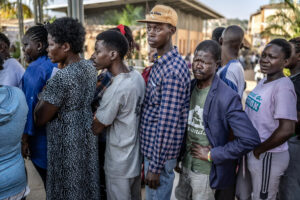At the invitation of UNESCO’s Global Media Defence Fund, RFK Human Rights joined other media freedom stakeholders from around the world to commemorate the 2025 World Press Freedom Day in Brussels, Belgium, from May 5 to 7, 2025. The celebration was organized under the theme Reporting in a Brave New World: The Impact of Artificial Intelligence on the Press and the Media.
The event began with a series of thematic dialogues and panel discussions on the impact of artificial intelligence on journalism—its practices, advancements, and safety implications. Given the vital role journalists play in society, especially amid rising authoritarianism and geopolitical tensions, a central question throughout the event was how to harness the benefits of AI while mitigating its risks and unintended consequences.
RFK Human Rights was represented by Senior Staff Attorney for Africa, Ikechukwu Uzoma. He participated in stakeholder consultations on advancing the protection of journalists through strategic litigation and advocacy before regional human rights mechanisms and intergovernmental bodies.
The highlight of the celebration was the Signature Event, featuring speeches from United Nations Secretary-General António Guterres, UNESCO Director-General Audrey Azoulay, and representatives from both the public and private sectors, including Jamie Banfi, General Director of the Gabo Foundation; Fiona Crack, Deputy Global Director of the BBC World Service; and Katrina Bureau, General Manager of Strategic Relations at Microsoft.
On the topic of artificial intelligence, Mr. Uzoma remarked, “The technology is growing at an astronomical rate, with tech companies investing trillions of dollars in research and development.” He added, “However, there is also a noticeable increase in technology-backed attacks on journalists and human rights defenders worldwide.” Addressing policymakers, he emphasized, “AI regulation and policy must prioritize human rights. Policymakers should adopt a ‘do-no-harm’ approach in the development and deployment of artificial intelligence to ensure it does not worsen existing democratic and developmental challenges.”
The celebrations wrapped up with the ceremony for the Guillermo Cano World Press Freedom Prize. This year, Nicaraguan Newspaper La Prensa received the award on the recommendation of an international jury composed of leading media professionals. La Prensa won the award for its courageous work in the face of severe repression from the Nicaraguan government. In response to the award, the government announced that it would withdraw from UNESCO—a testament to the climate in which journalists and human rights defenders work across the world.



